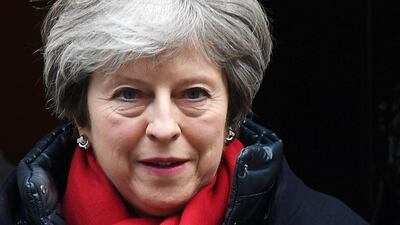British Prime Minister Theresa May has described the UK’s gender pay gap as a “burning injustice” and said that society will remain poorer for as long as it persists.
Writing in The Telegraph newspaper on Wednesday, Mrs May said that equality in pay is a fundamental right, similar to having the vote. But despite all the progress made since British women first won the right to vote a century ago, "major injustices still hold too many women back", she said. "One such is the gender pay gap."
The remarks came as a deadline approached for British companies to publish data on their pay gap. By midnight on Wednesday, employers with 250 or more staff in the UK were required to publish the difference in median hourly wages earned by men and women. More than 8,800 of about 9,000 companies had already done so by Wednesday afternoon.
Seventy-eight per cent showed a pay gap in favour of men. Fourteen per cent swung in favour of women, while 8 per cent had no gap.
According to the government, the country’s overall pay gap is 18.1 per cent.
Firms are supposed to produce a plan to narrow the gap.
_______________
Read more:
Women face an uphill wage battle in Britain's finance sector
Gender equality key to driving global business, report says
_______________
While the ruling Conservative Party is not legally required to take part given it has too few employees, it has revealed that on average it pays its female staff more than its men.
MP Rehman Chishti, who serves as the Conservatives' vice chair, told BBC Radio that the party has a median pay gap of 12.9 per cent in favour of women.
The party, which has had Britain’s only female prime ministers, added that it will voluntarily put out full details on Thursday.
The main opposition Labour party, which put out its figures in February, said it pays men slightly higher on average. Neither set of data included the pay of MPs.
Mrs May said that aside from arguments about equality, there is an obvious economic imperative to addressing the gap in earnings between the sexes.
"It is estimated that if women and men enjoyed parity in their hours, pay and seniority at work then we could see up to £150 billion added to our GDP," she wrote in The Telegraph.
“Making full use of women’s academic achievements, experience and talents would help boost UK productivity, to the benefit of our whole economy.”
She warned that the full statistics published by companies would make for “uncomfortable reading”, and said her party was committed to tackling the problem.
Introducing mandatory gender pay gap reporting for large employers last year, which led to Wednesday’s deadline, is just one way in which the government is seeking to improve transparency and address the issue, she said.
“By making this information public, organisations will no longer have anywhere to hide,” she warned. “We will have established a baseline from which to hold them to account in the future.”
Mrs May also took the opportunity to congratulate firms which, she said, have taken concrete steps towards levelling the playing field for pay. She welcomed Virgin Money setting a target to achieve a 50:50 gender balance throughout the firm within two years. And she applauded efforts by TSB to help women return to the workplace after taking time out for children or other care duties.
“Helping to make the most of women’s talent is in their own commercial interest, and it is in our national interest too,” she said.
“We should… celebrate success and congratulate those firms and organisations which are taking action to make the world of work a more equal place.”

